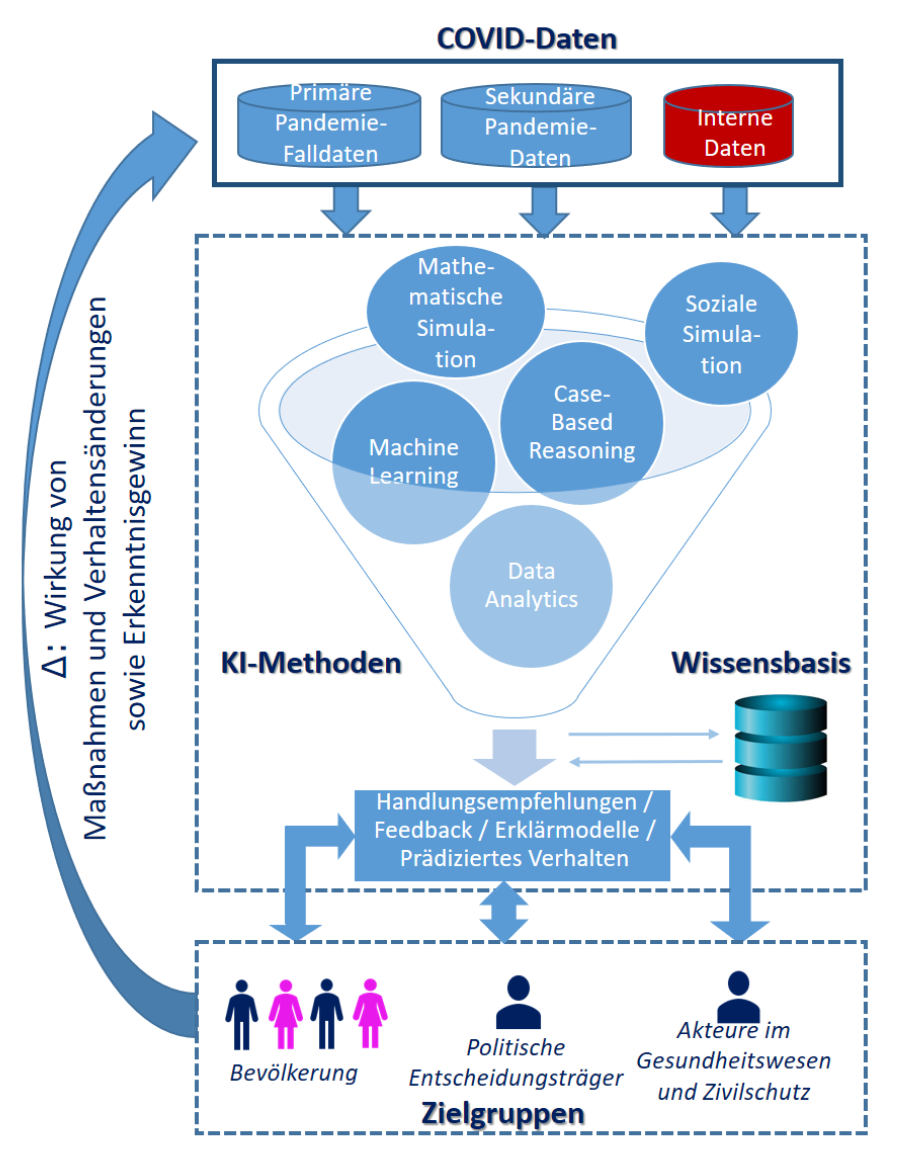AI and COVID
Explainability and Decision Support with AI in Pandemic Situations
About the project
Participating Researchers

About the project
The project AI and COVID is realized in cooperation of four research groups of the University of Koblenz. The Department of Computer Science is involved through the research groups Administrative Informatics (Prof. Dr. Maria A. Wimmer, Project Manager), IT and Data Security (Prof. Dr. Andreas Mauthe) and Software Engineering (Prof. Dr. Jan Jürjens), the Department of Mathematics and Natural Sciences by the Modeling and Simulation working group (Prof. Dr. Thomas Götz). The AI and COVID project is investigating which methods and tools of artificial intelligence (AI) can be used to reduce the complexity of taking measures to contain pandemics and preventive protection of the population. The advances in digitization now offer very large amounts of data for evaluating and forecasting the development of the pandemic and for supporting civil defense in order to derive and control regional measures and action strategies to combat the pandemic. However, the complex decision-making processes necessary in this context pose major challenges, above all for political decision-makers and full-time and honorary officials in the health care system and civil defense (health authorities, doctors and hospitals, rescue services, etc.), because they have to be aware of the basic facts relevant to health and care also incorporate social, economic and socio-political influencing factors into their decision-making and taking measures. From the point of view of the citizens, the decisions made do not always seem sufficiently transparent, as the experience with the COVID-19 pandemic shows. During a pandemic, a wide range of data (e.g. on the number of cases and measures) is collected by authorities, offices and other institutions and some of it is made publicly available. Based on this data, AI in connection with various data analysis methods should help to evaluate and interpret the current data situation quickly and reliably (i.e. trustworthy and valid). AI and data analysis methods are intended to support the various actors in order to better understand the pandemic situation in order to ultimately derive a faster basis for decision-making for appropriate and objectively justifiable measures. The aim of the COVID and KI project is therefore to develop an AI-supported expert system which, on the one hand, provides recommendations for rules of conduct and measures to reduce the risk of COVID-19 infection in the population and, on the other hand, supports authorities in the areas of health care, civil protection and rescue services, targeted To give measures regarding civil protection and measures to manage and contain the pandemic. As a solution, self-learning AI-based methods of machine learning (such as case-based reasoning and deep neural networks) are to be used on the basis of available data and experiences from past events. These methods are complemented by agent-based simulations of social behavior as well as mathematical simulations of COVID-19 epidemiological dynamics. The entire process from data analysis to the generation of recommendations for action should be disclosed in a transparent, comprehensible and explainable manner in order to make data, methods and tools validatable. Overall, this solution approach must be considered and worked out both at the process level and at the architecture and application level, also from the point of view of data protection and data security, insofar as non-publicly accessible, highly sensitive data is processed. The core elements of this comprehensive approach to AI-based analysis and control of pandemic situations are being developed in interconnected sub-projects and combined into an overall system: Data analysis and structuring Methods of artificial intelligence and machine learning Methods of mathematical and social simulation Reference architecture for integrated data protection and data security Integration and system merging.
Partnerticipating Researchers

Prof. Dr. Thomas Götz, Mathematisches Institut
Dr. Radomir Pestow, Mathematisches Institut

Dr. Schayan Ahmadian, FG Software Engineering
Prof. Dr. Jan Jürjens, FG Software Engineering
Dr. Hamed Khalili, FG E-Government
Dr. Ulf Lotzmann, FG E-Government
Prof. Dr. Andreas Mauthe, FG IT Sicherheit und Datensicherheit
Prof. Dr. Maria A. Wimmer, FG E-Government (Sprecherin)
